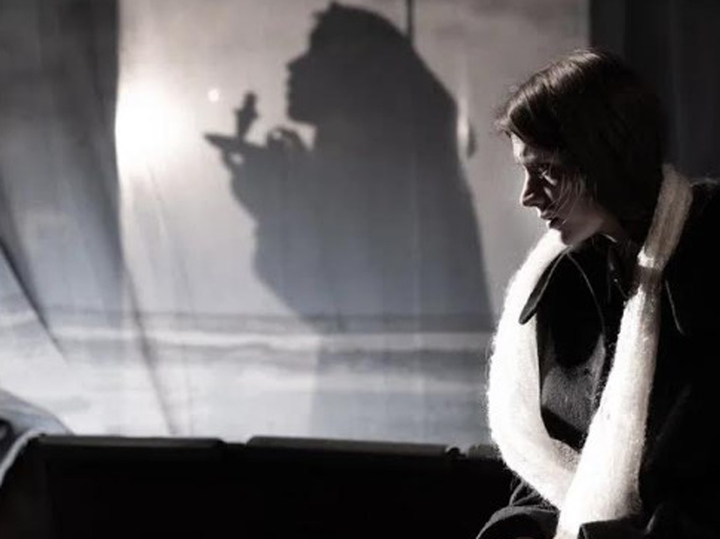Shpalikov’s latest film script was shown on the STI stage
[ad_1]
How can you become happy yourself and make everyone happy? This question, instead of the actual one – “How to survive?” – asks the hero of the premiere performance at the Sergei Zhenovach Dramatic Art Studio. Here, Gennady Shpalikov’s 1966 film script “A Long Happy Life” took on theatrical life. From the premiere show – MK columnist.
Shpalikov’s title contains both a paradox and a fairy tale. Indeed, can happiness last long? And if so, then only in a fairy tale with an unchanged ending: “they lived happily ever after and died on the same day.” The sixties-born Shpalikov, who became the special poetic voice of the Soviet “thaw,” has neither one nor the other in his script. His life is simple, and this is the key word in his latest film script, which became his first and last directorial work. And very interesting (I recently rewatched it), but not appreciated by contemporaries: at the premiere in 1966, the picture was received without much enthusiasm: “… the plot was exhausted, and the barge floated and floated, endlessly, the nerves of contemporaries could not stand it.” The innovation of Shpalikov the director was appreciated decades later: both his “premonition of an era of stagnation and his farewell to the romantic ideals of youth,” according to Andrei Konchalovsky.
The director of the play at STI, Sergei Tonyshev, has no barges in the Small Hall on the third floor – only their horns. But he has a theater within a theater, he has quotes from Shpaliko’s film, which in turn quoted documentary footage, but also of an exclusively theatrical nature. And the production really needed this.
It is as if the viewer, together with one of the main characters, finds himself behind the scenes of a certain theater, which is emphasized by the scenery (artist Philip Shein): the viewer sees the back side of a large curtain with uneven folds, realizing that behind it is a stage. There will be a life of his own on stage, and at the same time, he and she will meet in the visible backstage. Shpalikov’s times were not yet spoiled by gender uncertainty, and even science fiction writers did not dare to think about transgenderism in their daring fantasies.
And here he and she are in the proposed circumstances: in life, in the theater, in public catering, on the pier. In search of happiness, love – you can say so. But it can be done differently, the director is sure. “Everything is much more interesting, deeper, more incredible and therefore more truthful. The viewer will plunge into the author’s stream of consciousness, into his feelings and desires, into his flight. “If only I could make everyone happy…”

This is exactly what the short-haired guy (Daniil Obukhov), dressed in the fashion of the 60s, is talking about, internally free and talking about this and that. He, like a theater lighting designer, places a lighting device from the last century on a tripod, catching the couple with their short conversations with the beam:
– And you there…
– No…
– So you are a scout?
He (Igor Lizengevich) is either a scout, or a geologist, or he is fooling the girl, making himself interesting to her. I fell in love, went to the theater, and there were guest performers from Moscow: “The Cherry Orchard” was playing, and their seemingly insignificant conversation was cut into: “Who bought it?” – “I bought. The cherry orchard is mine now!” On the stage named after Ranevskaya it is sold, destinies are destroyed, and behind the curtain destinies are just beginning to take shape. She (Olga Balatskaya) is easy, but apparently, her destiny as a woman is not arranged, something didn’t work out, and here she is either a geologist or a scout… In general, there is hope. And at the same time, the Moscow Art Theater artists speak in beautiful voices in the old manner. And then there’s a short-haired narrator (who’s also a lighting designer) talking about his own things, about today’s events. Tonyshev has such theatrical polyphony in STI.

And in a small space, a voluminous life is built, albeit not long and not happy, and not a flat, boring and wretched version of it. The atmosphere, words, feelings hidden behind the words, and something else that, without bright, cool and other visualizations, explains: love could have been long and happy, but it didn’t work out. Why? If only I knew, if only I knew – Chekhov’s mood, painted with pure, transparent colors, drowns in a transparent (or ghostly?) light (artist Damir Ismagilov), seemingly under optional sounds, but this does not cease to be appropriate (composer Alexandra Yarchevskaya) .
It remains to be added that “A Long Happy Life” was released as part of the season declared as the season of students.
[ad_2]
Source link






